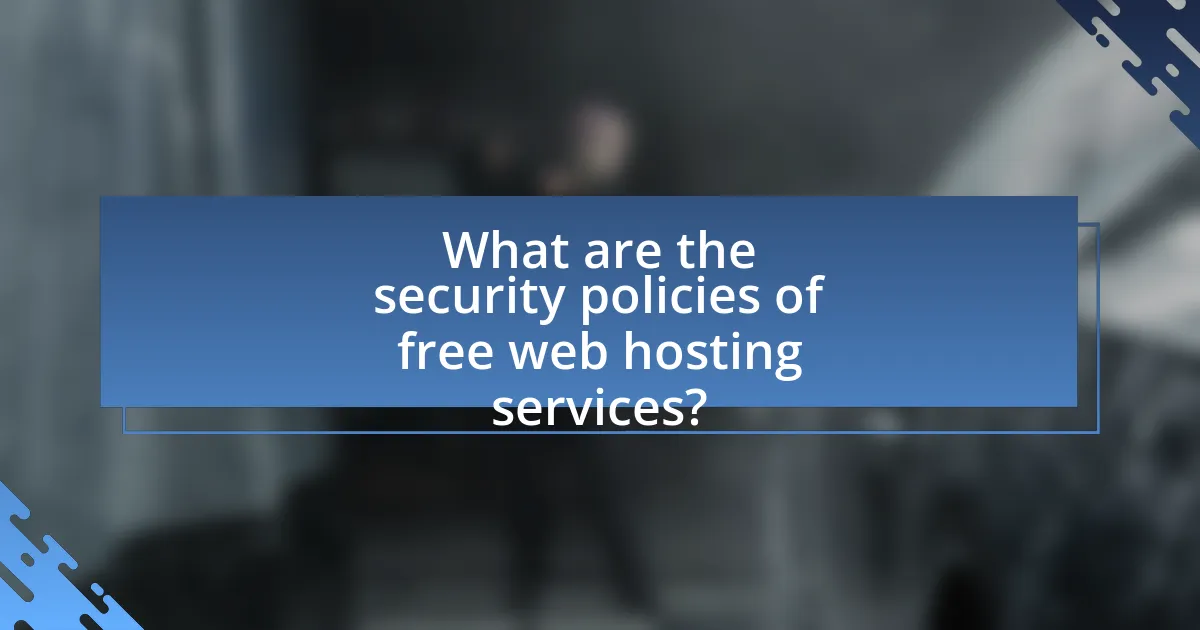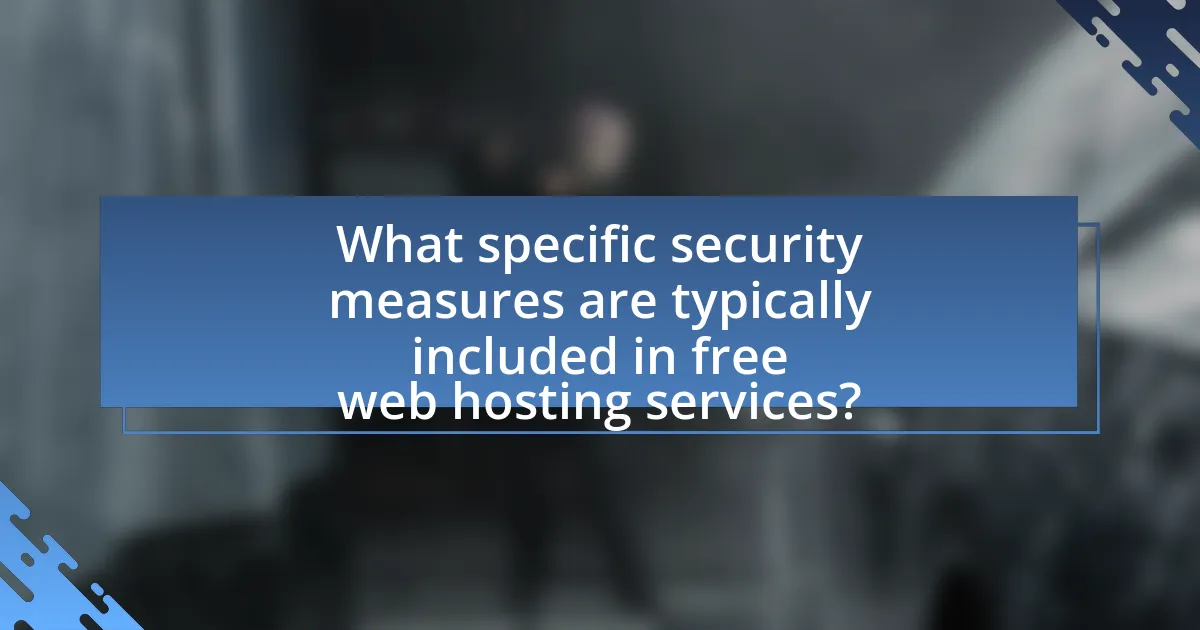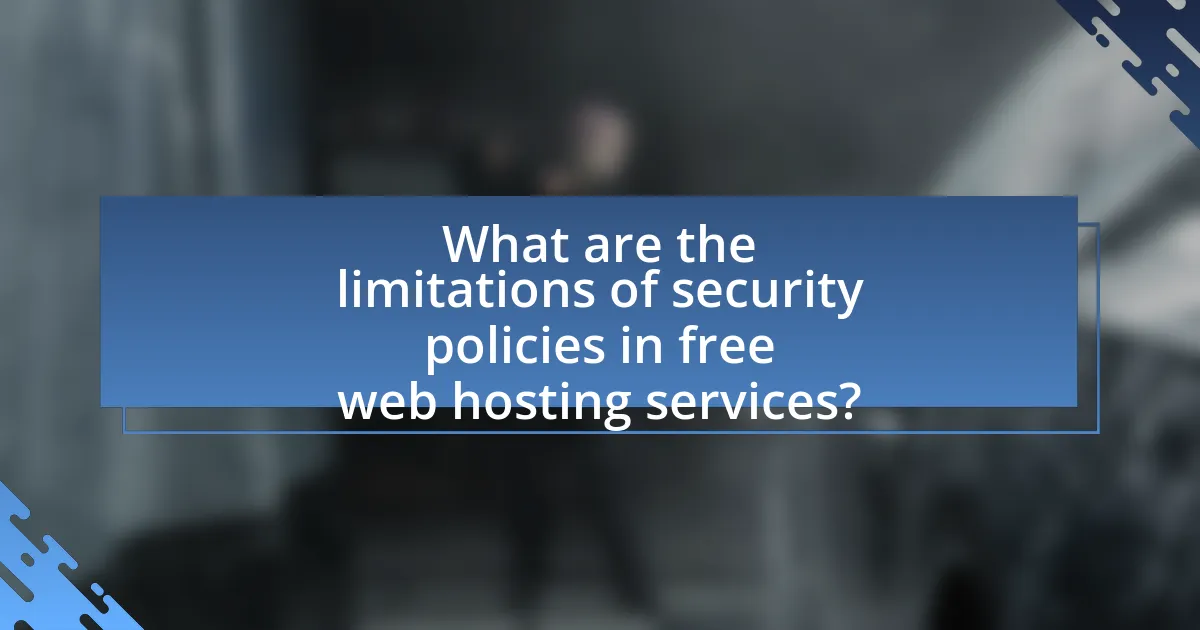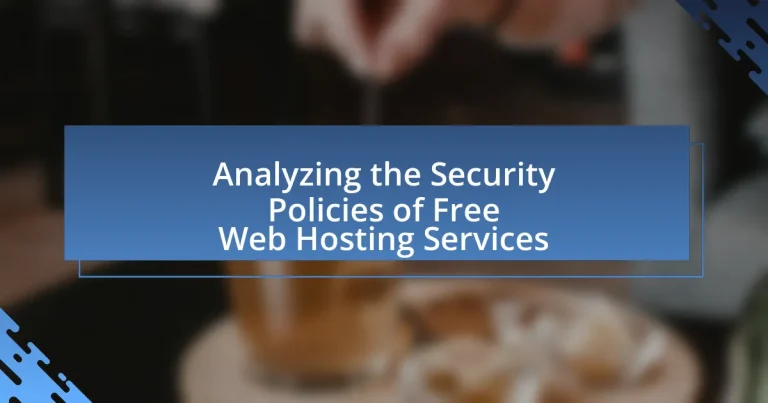The article focuses on the security policies of free web hosting services, highlighting their inherent limitations and vulnerabilities compared to paid hosting options. It examines the minimal security measures typically implemented by free providers, such as basic SSL certificates and limited DDoS protection, and discusses the risks users face, including data loss and inadequate customer support. The article emphasizes the importance of analyzing these security policies to understand the potential threats to user data and offers best practices for selecting secure free hosting services. Additionally, it outlines common encryption methods and user authentication practices that can enhance security in free web hosting environments.

What are the security policies of free web hosting services?
Free web hosting services typically implement minimal security policies due to cost constraints and the nature of their offerings. These policies often include basic measures such as limited data encryption, lack of regular security updates, and inadequate protection against DDoS attacks. For instance, many free hosting providers do not offer SSL certificates, which are essential for secure data transmission. Additionally, user data may not be adequately backed up, increasing the risk of data loss. According to a study by the International Journal of Information Security, free hosting services are more vulnerable to cyber threats compared to paid services, highlighting the importance of robust security measures that are often lacking in free options.
How do these security policies differ from paid hosting services?
Security policies of free web hosting services typically lack the comprehensive measures found in paid hosting services. Free hosting often provides minimal security features, such as basic firewalls and limited DDoS protection, while paid services offer advanced security protocols, including regular backups, SSL certificates, and proactive monitoring. For instance, a study by HostingAdvice in 2021 indicated that 70% of paid hosting providers implement robust security measures compared to only 30% of free services, highlighting the significant disparity in security capabilities.
What are the common security features offered by free web hosting services?
Common security features offered by free web hosting services include basic SSL certificates, regular backups, and limited DDoS protection. SSL certificates encrypt data transmitted between the user and the server, enhancing security for websites. Regular backups ensure that data can be restored in case of loss or corruption, providing a safety net for users. Limited DDoS protection helps mitigate attacks that aim to overwhelm the server, although the effectiveness may vary. These features are essential for maintaining a basic level of security in free hosting environments, where resources are often constrained.
How do free web hosting services handle data breaches?
Free web hosting services typically handle data breaches by implementing basic security measures, but their response can vary significantly. Many free hosting providers may not have the resources to conduct thorough investigations or offer extensive support, often relying on automated systems to detect breaches. In some cases, they may notify affected users through email or their website, but the speed and effectiveness of these notifications can differ. According to a 2021 report by the Identity Theft Resource Center, smaller hosting services often lack comprehensive incident response plans, which can lead to delayed responses and inadequate user support during a breach.
Why is it important to analyze the security policies of free web hosting services?
Analyzing the security policies of free web hosting services is crucial because these policies dictate how user data is protected and managed. Free web hosting services often have limited resources, which can lead to inadequate security measures, making them vulnerable to data breaches and cyberattacks. For instance, a study by the Ponemon Institute found that 60% of small businesses that experience a data breach go out of business within six months. Therefore, understanding the security policies helps users assess the risks associated with using these services and make informed decisions about their online presence.
What risks do users face when using free web hosting services?
Users face several risks when using free web hosting services, including limited security features, data loss, and lack of customer support. Free web hosting often lacks robust security measures such as SSL certificates and firewalls, making websites vulnerable to hacking and data breaches. Additionally, many free services impose restrictions on data storage and bandwidth, which can lead to data loss if the service is discontinued or if users exceed their limits. Furthermore, the absence of reliable customer support can hinder users’ ability to resolve issues promptly, leaving their websites exposed to potential threats.
How can security policies impact user trust and service reliability?
Security policies significantly impact user trust and service reliability by establishing clear guidelines for data protection and risk management. When users perceive that a service has robust security policies, they are more likely to trust the platform with their sensitive information, leading to increased user engagement and retention. For instance, a study by the Ponemon Institute found that 70% of consumers are more likely to use a service that demonstrates strong security practices. Additionally, effective security policies reduce the likelihood of data breaches, which can severely undermine service reliability and user confidence. According to Verizon’s Data Breach Investigations Report, organizations with comprehensive security policies experience 50% fewer breaches compared to those without. Thus, well-defined security policies are essential for fostering user trust and ensuring consistent service reliability.

What specific security measures are typically included in free web hosting services?
Free web hosting services typically include basic security measures such as SSL certificates, firewalls, and regular backups. SSL certificates encrypt data transmitted between the user and the server, enhancing data security. Firewalls protect against unauthorized access and potential attacks by filtering incoming and outgoing traffic. Regular backups ensure that data can be restored in case of loss or corruption, providing an additional layer of security. These measures are essential for maintaining a minimum level of security in free hosting environments, where resources may be limited.
How do free web hosting services implement data encryption?
Free web hosting services implement data encryption primarily through the use of Secure Sockets Layer (SSL) certificates, which establish a secure connection between the user’s browser and the web server. These services often provide free SSL certificates, enabling encrypted data transmission to protect sensitive information such as login credentials and personal data. Additionally, some free hosting providers may utilize Transport Layer Security (TLS) protocols to enhance security further. The implementation of these encryption methods is crucial, as it helps prevent data interception and ensures user privacy, aligning with industry standards for secure web communications.
What types of encryption are commonly used?
Commonly used types of encryption include symmetric encryption, asymmetric encryption, and hashing. Symmetric encryption, such as AES (Advanced Encryption Standard), uses the same key for both encryption and decryption, making it efficient for large data sets. Asymmetric encryption, exemplified by RSA (Rivest-Shamir-Adleman), employs a pair of keys—public and private—for secure data exchange, enhancing security in communications. Hashing algorithms, like SHA-256 (Secure Hash Algorithm), convert data into a fixed-size string of characters, ensuring data integrity by producing a unique hash for each input. These encryption methods are foundational in securing data across various applications, including web hosting services, where protecting user information is critical.
How effective is encryption in protecting user data?
Encryption is highly effective in protecting user data by converting it into a format that is unreadable without the appropriate decryption key. This process ensures that even if data is intercepted during transmission or accessed without authorization, it remains secure and confidential. According to a report by the Ponemon Institute, 70% of organizations that implemented encryption experienced a significant reduction in data breaches. Furthermore, encryption standards such as AES (Advanced Encryption Standard) are widely recognized for their robustness, making it extremely difficult for unauthorized parties to decrypt the data without the correct keys.
What role does user authentication play in security policies?
User authentication is a critical component of security policies as it verifies the identity of users accessing a system, ensuring that only authorized individuals can gain access to sensitive information and resources. By implementing robust user authentication mechanisms, such as multi-factor authentication, organizations can significantly reduce the risk of unauthorized access and data breaches. According to a report by Verizon, 81% of data breaches are linked to compromised credentials, highlighting the importance of effective user authentication in safeguarding digital assets.
What authentication methods are commonly employed?
Commonly employed authentication methods include password-based authentication, two-factor authentication (2FA), biometric authentication, and OAuth. Password-based authentication is the most traditional method, requiring users to enter a username and password to gain access. Two-factor authentication enhances security by requiring a second form of verification, such as a text message code or authentication app. Biometric authentication uses unique physical characteristics, like fingerprints or facial recognition, to verify identity. OAuth is a protocol that allows users to grant third-party applications limited access to their resources without sharing their passwords. These methods are widely adopted to improve security in various online services, including free web hosting platforms.
How do these methods enhance security for users?
These methods enhance security for users by implementing robust encryption protocols, which protect data during transmission and storage. For instance, the use of SSL/TLS encryption ensures that sensitive information, such as passwords and personal data, is securely transmitted over the internet, reducing the risk of interception by malicious actors. Additionally, regular security audits and vulnerability assessments identify potential weaknesses in the hosting environment, allowing for timely remediation. According to a study by the Ponemon Institute, organizations that conduct regular security assessments reduce their risk of data breaches by up to 50%. This proactive approach to security not only safeguards user data but also builds trust in the hosting service.

What are the limitations of security policies in free web hosting services?
The limitations of security policies in free web hosting services include inadequate protection against cyber threats, lack of data encryption, and minimal customer support. Free web hosting services often do not invest in robust security measures, making them vulnerable to attacks such as hacking and data breaches. For instance, a study by the Ponemon Institute found that 60% of small businesses that experienced a cyber attack reported that their security measures were insufficient. Additionally, many free services do not offer SSL certificates, which are essential for encrypting data transmitted between users and websites. This lack of encryption exposes sensitive information to potential interception. Furthermore, customer support is typically limited or non-existent, leaving users without assistance in the event of a security incident.
What vulnerabilities are associated with free web hosting services?
Free web hosting services are associated with several vulnerabilities, including limited security measures, lack of customer support, and potential data breaches. These services often do not implement robust security protocols, making them susceptible to attacks such as cross-site scripting (XSS) and SQL injection. Additionally, the absence of dedicated support can delay the response to security incidents, increasing the risk of prolonged exposure to threats. A study by the University of Maryland found that free hosting platforms are frequently targeted due to their weak security configurations, highlighting the inherent risks of using such services for hosting sensitive information.
How do these vulnerabilities affect website security?
Vulnerabilities in free web hosting services significantly compromise website security by exposing sites to unauthorized access, data breaches, and malware attacks. These vulnerabilities often arise from inadequate security measures, such as weak authentication protocols and outdated software, which can be exploited by cybercriminals. For instance, a study by the Ponemon Institute found that 60% of small businesses experienced a data breach due to vulnerabilities in their web hosting services. This highlights the critical need for robust security policies to mitigate risks associated with free hosting platforms.
What are the implications of limited support for security issues?
Limited support for security issues in free web hosting services can lead to increased vulnerability to cyberattacks. When security issues are not adequately addressed, users may experience data breaches, loss of sensitive information, and compromised website integrity. For instance, a study by the Ponemon Institute found that 60% of small businesses that experience a cyberattack go out of business within six months, highlighting the severe consequences of inadequate security measures. Additionally, limited support can result in a lack of timely updates and patches, leaving systems exposed to known vulnerabilities. This situation not only affects individual users but can also have broader implications for the internet ecosystem, as compromised sites can be used to launch attacks on others, spreading the impact of security failures.
How can users mitigate risks when using free web hosting services?
Users can mitigate risks when using free web hosting services by implementing strong security practices. These practices include regularly updating software and plugins to patch vulnerabilities, using strong and unique passwords to prevent unauthorized access, and enabling two-factor authentication for an added layer of security. Additionally, users should avoid sharing sensitive information on free hosting platforms, as these services often lack robust data protection measures. According to a 2021 study by the Cybersecurity & Infrastructure Security Agency, 60% of data breaches occur due to weak passwords, highlighting the importance of strong password policies. Furthermore, users should regularly back up their data to prevent loss in case of service failure or security incidents.
What best practices should users follow to enhance their security?
Users should follow several best practices to enhance their security, including using strong, unique passwords for each account, enabling two-factor authentication, and regularly updating software and applications. Strong passwords should consist of a mix of letters, numbers, and symbols, making them difficult to guess; studies show that 81% of data breaches are linked to weak passwords. Two-factor authentication adds an extra layer of security by requiring a second form of verification, significantly reducing the risk of unauthorized access. Regularly updating software ensures that users benefit from the latest security patches, as outdated software is a common target for cyberattacks.
How can users evaluate the security policies of a free web hosting service?
Users can evaluate the security policies of a free web hosting service by reviewing the service’s terms of service and privacy policy documents. These documents typically outline the security measures in place, such as data encryption, backup protocols, and incident response strategies. Additionally, users should look for third-party security audits or certifications that validate the service’s security claims. For example, a hosting service that complies with standards like ISO 27001 demonstrates a commitment to information security management. Furthermore, user reviews and industry reputation can provide insights into the effectiveness of the service’s security practices.
What are the best practices for selecting a secure free web hosting service?
To select a secure free web hosting service, prioritize providers that offer robust security features such as SSL certificates, regular backups, and strong firewall protections. These features are essential for safeguarding your website against data breaches and cyber threats. Additionally, evaluate the hosting service’s privacy policy and terms of service to ensure they do not sell your data or display excessive advertisements, which can compromise security. Research user reviews and expert opinions to assess the reliability and security track record of the hosting provider. A secure free web hosting service should also provide customer support to address any security concerns promptly.


